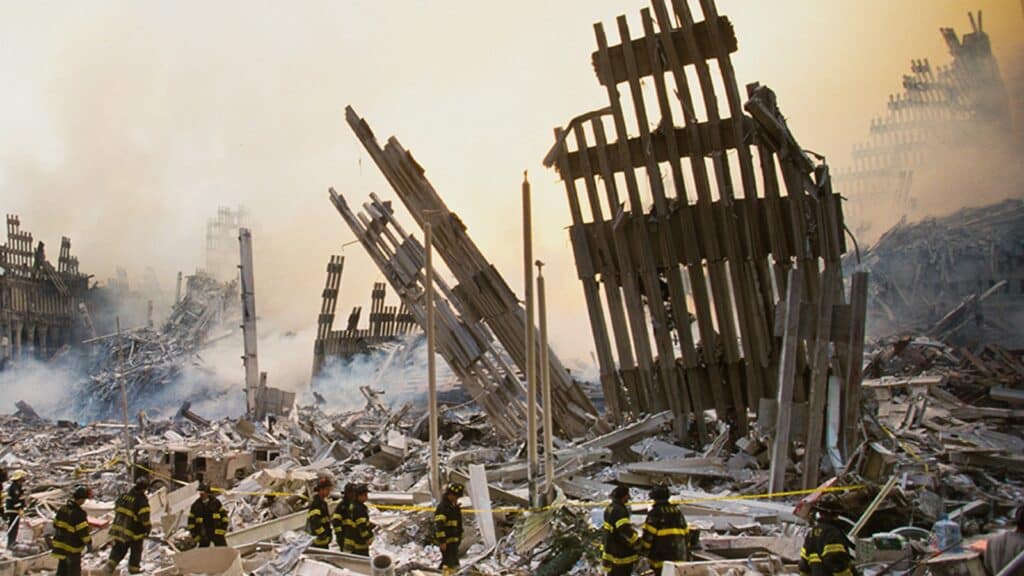Today marks the 24th anniversary of the September 11, 2001 terror attacks, one of the deadliest days in modern history. Under the orders of al-Qaeda leader Osama bin Laden, 19 Arab terrorists hijacked four commercial aircraft in the United States, executing a coordinated assault that killed nearly 3,000 people and altered the global security landscape forever.
The Day of the Attacks
On the morning of September 11, four planes were hijacked within minutes of each other. American Airlines Flight 11 struck the North Tower of the World Trade Center at 8:46 a.m., followed by United Airlines Flight 175 crashing into the South Tower at 9:03 a.m. Less than an hour later, American Airlines Flight 77 slammed into the Pentagon. The fourth plane, United Airlines Flight 93, was believed to be headed for the White House or U.S. Capitol but crashed into a field in Pennsylvania after passengers resisted the hijackers.
By 10:30 a.m., both towers of the World Trade Center had collapsed, sending shockwaves across the world.
Who Were the Hijackers?
The 19 men, mostly Saudi nationals with ties to al-Qaeda, had been carefully selected and trained for years. Many had traveled through Afghanistan’s militant camps before entering the U.S. on student or tourist visas, blending into American society as they prepared for the operation.
Flight 11 – North Tower (5 hijackers):
Mohamed Atta (Egypt): Operational leader of 9/11, responsible for coordinating all four hijackings.
Abdulaziz al-Omari (Saudi Arabia): A trained cleric and close accomplice of Atta.
Wail al-Shehri & Waleed al-Shehri (Saudi Arabia): Brothers, both with militant backgrounds in Afghanistan and Chechnya.
Satam al-Suqami (Saudi Arabia): A law student radicalized before joining al-Qaeda.
Flight 175 – South Tower (5 hijackers):
Marwan al-Shehhi (UAE): Pilot who flew the plane into the South Tower; close friend of Atta.
Fayez Banihammad (UAE): Graduate who trained at flight schools in the U.S.
Hamza al-Ghamdi & Ahmed al-Ghamdi (Saudi Arabia): Brothers, both veterans of Afghanistan’s militant camps.
Mohand al-Shehri (Saudi Arabia): Recruited while seeking jihad opportunities abroad.
Flight 77 – Pentagon (5 hijackers):
Hani Hanjour (Saudi Arabia): Trained pilot, flew the plane into the Pentagon.
Nawaf al-Hazmi & Salem al-Hazmi (Saudi Arabia): Brothers with long-standing ties to jihad networks.
Khalid al-Mihdhar (Saudi Arabia): Attended al-Qaeda meetings in Malaysia before 9/11.
Majed Moqed (Saudi Arabia): Law student radicalized before joining the mission.
Flight 93 – Pennsylvania crash (4 hijackers):
Ziad Jarrah (Lebanon): Pilot of the flight, educated in Germany, became radicalized in Afghanistan.
Saeed al-Ghamdi (Saudi Arabia): Fought in Chechnya before being recruited by al-Qaeda.
Ahmed al-Haznawi (Saudi Arabia): Young recruit who traveled through Afghanistan before joining the operation.
Ahmed al-Nami (Saudi Arabia): Radicalized in his early 20s, selected for the suicide mission.
Aftermath and Global Impact
Osama bin Laden later claimed responsibility for the attacks, praising the hijackers as “martyrs.” He released their identities and celebrated their actions as a strike against the United States.
The consequences were immediate and far-reaching:
The U.S. declared the “War on Terror”, launching invasions of Afghanistan in 2001 and Iraq in 2003.
Global security policies shifted dramatically, from airport security overhauls to international counterterrorism alliances.
The attacks fueled nearly two decades of war, reshaping geopolitics and costing millions of lives through conflict, displacement, and instability.
Legacy
The 9/11 attacks remain a defining moment of the 21st century. The identities of the 19 hijackers, their routes into the U.S., and their connections to al-Qaeda continue to be studied as cautionary lessons in intelligence, security, and international cooperation.
Nearly a quarter-century later, the memory of that day serves as both a reminder of the cost of extremism and a turning point that forever changed global politics.





